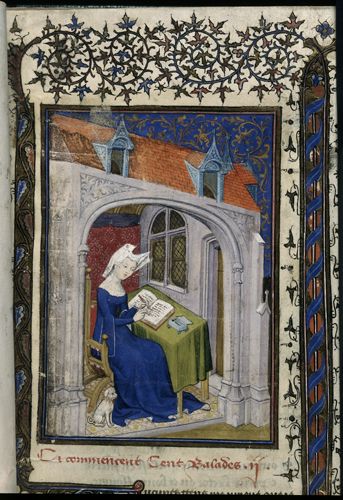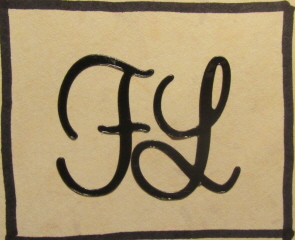Editor’s Note: This post is second in a new The Feminists are Teaching feature showcasing work done by junior scholars in the Integrative Humanities class taught by Dr. Meriem Pages at Keene State College, Introduction to Thinking and Writing 101: Medieval Women Writers. See Dr. Pages’s introduction for a description of the class and the assignment.
The Confidence of Christine de Pizan
Robin Chaney
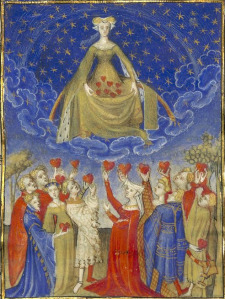
Feminism is a word with a wide range of different meanings. If one were to look at modern feminism, one would define feminism as independent women fighting for their rights. By creating their own definition of feminism, women today are encouraging younger girls to accept their flaws and feel confidence in themselves rather than seek the approval of others. In The Book of the City of Ladies, Christine de Pizan goes on a journey to find out who she truly is and finds within herself the confidence that had been there all along. If we were to look at Christine’s actions and traits now, we could conclude that she comes closest to embodying the ideals of modern feminism because she herself is not the definition of perfection, and she supports her opinions about gender equality.
During the Middle Ages, feminism was not even a word. It was an issue that was never addressed. Christine confronted society in a way that would not get her in trouble and addressed the “elephant in the room.” She questioned the idea that women are purely sexualized beings and voiced her opinions on how women should be viewed. In this way, she was able to pass judgment on society without being criticized and shunned for her opinions.
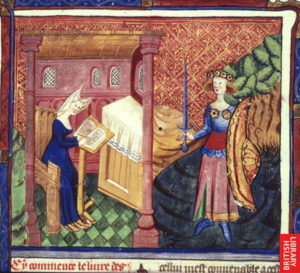
Christine can be seen as a modern feminist in many ways. She makes no reference to sex in any part of her writing. Her husband is barely mentioned along with their sex life; she puts the focus on the excellence of women and the fact that they do not need men. According to Christine, confidence comes from oneself and one’s independence. Independent women whose husbands or significant others have passed on or are non-existent need to take control of their own lives and move on. Although losing one’s lover is devastating, Christine is making an effort to find who she really is without the help of a man. Her message is directed at future generations of women all over the world. By writing for future generations, Christine sends women the message that they possess virtues. Women should always be seen as knowledgeable and intelligent, meaning it should be recognized that women can think for themselves. And if a woman is not able to do this without a man in her life, the couple needs to work together in order for their relationship to be successful.
There are, however, certain aspects of modern feminism that Christine does not express in her stories simply because she does not have a very clear understanding of the message she is trying to get across in her writing; she has to constantly reassure herself that her ideas are clear and accurate in order to leave a clear message for future generations. That is why she uses three angels to reference the multiple examples running through her head. The angels talk Christine through the process that lead to her understanding the concept that will become feminism. The angels have to keep giving Christine proof to help her come to terms with the accuracy of her opinions and the inequality of her society. Each one of the names of the angels is connected to our modern definition of feminism: Reason, Rectitude and Justice.
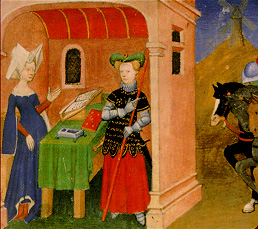
The angels that help Christine are interesting figures. Reason is sent to Christine to speak of the message inherent to The Book of the City of Ladies: Christine has to find within herself that she is smart and knowledgeable and that there is nothing wrong with being an intelligent woman. Morally correct behavior is a concept that Christine needs to seek and recognize immediately within herself according to Rectitude. Christine is a woman of poise who raised children on her own and without the help of a male figure. She never complains about anyone and never blames others for her mistakes. Her behavior is very mature.
The last angel to come to Christine is known by the name of Justice. More often than not, feminists are seen as fighting for their freedom and independence. If one were to think of a woman who exemplified the word justice, one would think of Perpetua in that she fought for her people and never backed down. If one were to look at Christine, one would think she is not very violent or aggressive. But, what Christine does have is pride and respect for others. She needs to learn how to stick up for herself rather than other people. Justice is there to show her that she does not have to be physically tough, but mentally powerful and strong.
Out of the seven women [studied in this class], (Heloise, Perpetua, Hrotsvitha of Gandersheim, Julian of Norwich, Christine de Pizan and Margery Kempe), Christine de Pizan comes closest to embodying the ideals of modern feminism. Christine also embodies the independent woman perfectly. She makes an effort to find out who she is on her own rather than by letting a man dictate her life. Although Christine allows angels to guide her, the angels come from her own imagination and she slowly reassures herself that she lives a happy life without a man to satisfy and lead her. Modern feminists today embody what Christine was trying to get across in the Middle Ages and their progress is making a difference of which she would have been proud.
About the author
Robin Chaney is an incoming sophomore at Keene State College with a major in management and a minor in theater. Her other interests include singing and acting. Taking a yearlong medieval literature class with Meriem Pages sparked an interest in medieval feminism, and the papers she wrote bring light to the women of the Middle Ages and how they were received.
